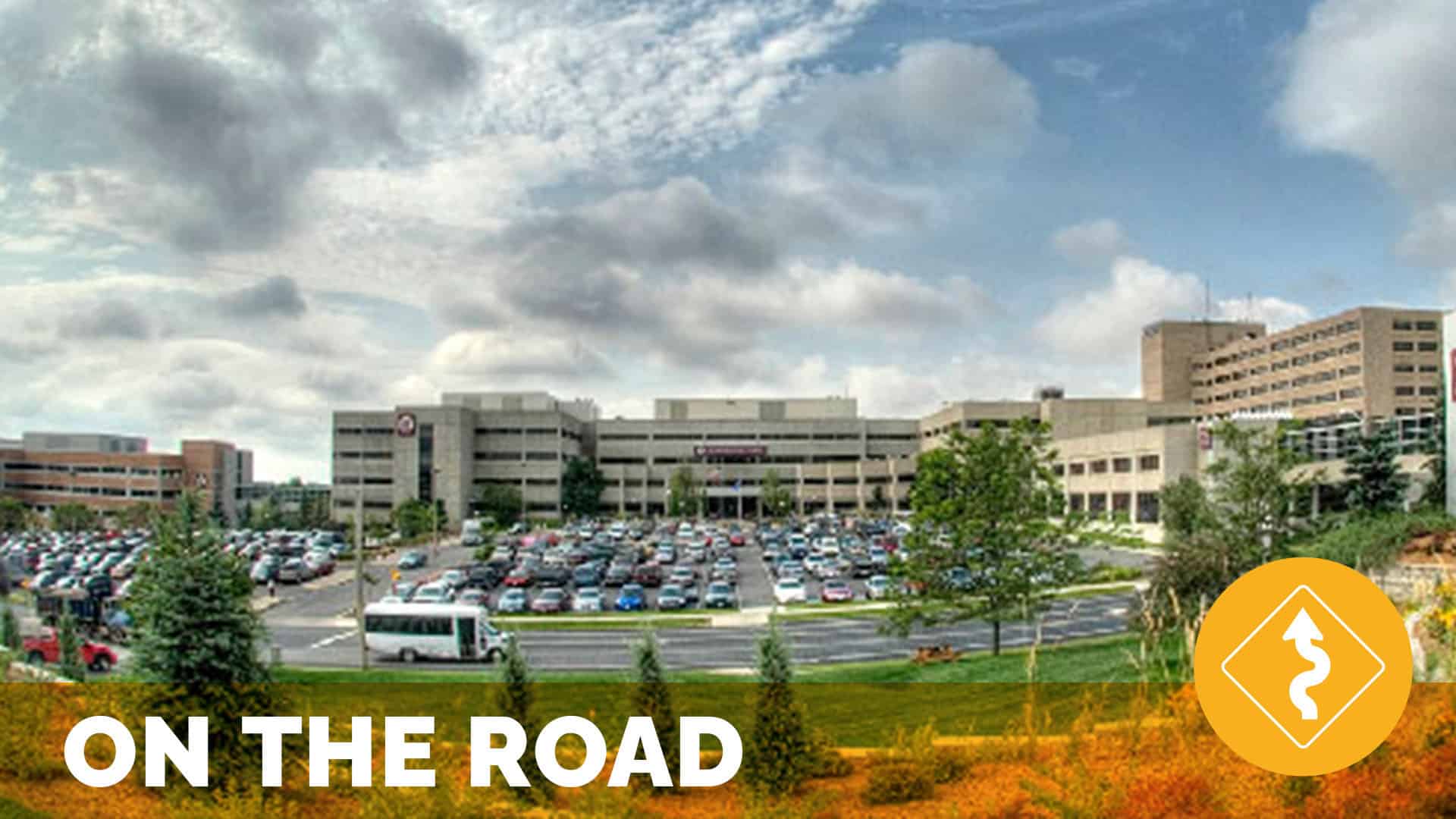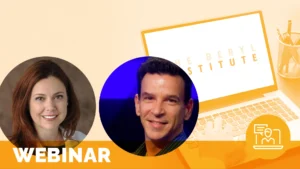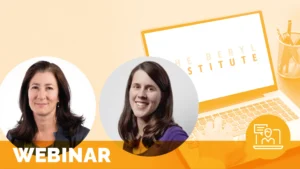A Rich History and Tradition of Partnership

On the Road with Marshfield Clinic – August 2017
by Deanna Frings
Our latest On the Road took me through my home state of Wisconsin to Marshfield Clinic Health System (MCHS), a regional destination for world class health care for over 100 years. It was founded in 1916 by six physicians coming together to care for the community, naming their practice the same name as this small rural town – Marshfield.
Like many small towns, Marshfield has grown and is known as “The City in the Center” with easy access to major highways, serving this region well and allowing MCHS to provide accessible, affordable and compassionate health care to many. A nonprofit organization, MCHS employs more than 700 physician specialists in 86 specialties and subspecialties and has 56 regional sites in central, northern and western Wisconsin.
A History of World Class Care
My hosts were Dr. Brandon Parkhurst, patient experience medical director, and his colleague Nancy Stueland-Adamski, patient experience director. They had a full day planned that began by meeting Dr. Narayana S. Murali, president & CEO, MCHS Hospitals Inc. and executive director, Marshfield Clinic.
As you travel through central Wisconsin, it might be easy to overlook this impressive health care system as you enjoy this beautiful landscape of rolling green hills, well-groomed farmland and the tall cornfields. Dr. Murali quickly and proudly shared the many ways MCHS lives out its mission to create healthy communities through the extensive services they provide. He offered, “We can do anything you would expect from a large integrated health care system.” In addition to an extensive network of primary care and a range of specialty services, some things that stood out are their comprehensive research programs and focus on education.
Marshfield Clinic Research Institute, a division of Marshfield Clinic, was founded in 1959. It is the largest private medical research institute in Wisconsin and has research centers in clinical research, agricultural health and safety, epidemiology, human genetics and biomedical informatics.
Along with research is an equally proud history of education with MCHS establishing their first residency program in 1927. The program expanded to include surgical residents in 1931 and established an independent entity for education as recently as 2007. Approximately 78 residents are supported through this program annually where they learn early on the importance of the patient experience.
A Partnership with Patients
Partnering with patients to fully appreciate their experience isn’t new for MCHS. They have been asking for and collecting patient feedback well before HCAHPS became a common acronym. They are proud of this fact and believe it’s another demonstration of their long history of a patient-first culture and value of partnership. In fact, Dr. Parkhurst shared a screen shot from an orientation brochure from 1956 titled Focus on the Patient. It listed 10 statements. Some examples include: the patient is the most important person in Marshfield Clinic, the patient is dependent on us; our reputation is dependent upon the patient and the patient is not an interruption of our work; the patient is our work.
In 2011, MCHS began exploring a partnership with an external patient satisfaction vendor as a means to expand their ability to stay connected to their patients’ experiences and apply a more rigorous system of data collection. In 2012, they established the department of Patient Experience. The department has continued to grow since its inception expanding from the original two full-time employees to seven today.
I was privileged to meet many of these individuals during my visit. As organizational members of The Beryl Institute, this was not the first time I had the honor of interacting with this team. They have been extremely involved within the patient experience community. Dr. Parkhurst was one of the first to complete the Body of Knowledge Courses, is a frequent participant in the PX Leader list serve and is a leader of The Beryl Institute Physician Community. This past year he co-presented a webinar titled Embracing Transparency in Patient Experience Reporting: Gaining Physician/Provider Buy-In and Support highlighting MCHS’ journey in sharing their data with their patients.
In addition, both Nancy and Dr. Parkhurst have achieved the Certified Patient Experience Professional (CPXP) designation offered through Patient Experience Institute and are supporting their teams to achieve the same. They are wonderful role models in partnership, coaching and mentoring for their team and have generously shared their journey with the Institute’s patient experience community.
Partnering and Supporting Leaders
The critical role leaders play in building and sustaining a patient- centered culture is not overlooked at MCHS. They have developed resources and education to support leaders’ success in building high-performing and engaged teams. Terri Newmier, Director of Talent Acquisition and Workforce Development and Deb Oleson Brock, Senior Employee Relations Manager, spent time with me reviewing employee selection, employee engagement and the impact on patient experience. We often talk about how important new employees are influencing an organizational culture. To ensure the best fit possible for both the candidate and the organization, a recently revised selection process is being used at MCHS that includes a requirement that all candidates commit to support the culture they are joining. Each candidate signs a document attesting to six statements, one being to “Demonstrate the attitude and talent to optimize the health care experience and build trust with every patient/customer I serve.”
Leaders have received coaching and education on the revised selection process and are now consistently including interview questions that explore the candidates fit in working in a patient-centered environment. The development of these questions was supported by the involvement of Nancy in her role as Patient Experience Director, another great example of MCHS’ value of partnership.
Deb highlighted education all leaders are currently receiving on employee engagement and its impact on the experience. She explains that employee engagement goes beyond satisfaction and is more about an individual’s emotional connection to work and the organization. Our conversation resonated with me, in part, because The Beryl Institute’s recent 2017 Benchmarking Study revealed a focus on employee engagement is now seen as a central driver in experience efforts. MCHS continues to offer this leadership series each month and has received positive feedback and high attendance. They have already started planning their 2018 calendar.
In addition, Barb Agen, manager of corporate education, shared that MCHS has an extensive new leader onboarding program, a patient experience series and she is currently partnering with their human resources team to build upon a successful lunch and learn series.
Partnering with Leaders in the Field
As we neared the end of our visit, Nancy coordinated a virtual visit with five MCHS operational leaders, a great reflection of the geography served by MCHS. Connecting via video conference, Nancy facilitated this session framed by thoughtful and thought-provoking questions that produced a great conversation and reinforced their commitment to accessible, affordable and compassionate health-care for the communities they serve.
The leaders each shared a variety of strategies and pearls of wisdom they have used and learned over the years. Some examples are highlighted below:
Julie Clark: She monitors her patient experience data on a regular basis including reviewing patient comments each week. She takes this opportunity to highlight the positive comments, puts a smiley face sticker on the comment and includes a special note, “You have been caught being nice.” This small but consistent gesture brings a smile to the physicians and reinforces the positive impact they have in the lives of their patients.
Patti Jozwiak: One of her greatest strategies is using positive reinforcement. She wants her team to be empowered to take action in any given situation. She sets clear expectations, ensures a common understanding and reinforces those behaviors through positive praise and thanks. She explained that this approach results in the staff taking accountability not only for their behavior but for the culture of the department. In fact, some employees who were not a good fit actually self-selected to leave, a powerful example of the impact when using positive reinforcement.
Lea Buckridge, RN: New to her leadership role, her staff was curious if she missed taking care of patients. Her pearl of wisdom came when she acknowledged the fulfillment she received in caring for patients now comes from ensuring they (her staff) are well cared for and have what they need to provide exceptional care and service.
Barb Stevens: Barb has come to appreciate the distinction of visibility and accessibility. Because the clinics cover a large geographical area, it is not always possible to be onsite every day at every clinic. Barb shared that while she can’t be visible at all times she can be accessible and this is a key priority in her leadership practice.
Jeron Jackson: “You can’t do it alone” is an important mantra for Jeron. This really brings us back to the start of our day, a history of partnership. MCHS was formed in partnership of six physicians and it is in partnership that Jeron and many of his colleagues are able to achieve patient experience data above the 95th percentile in their peer group. Partnership with the physicians in his clinic, partnership with his employees and partnership with the patients and families that come to receive care.
MCHS has a rich history and tradition of partnership. This will only serve them well as they build their future over the next 100 years as a strong, integrated health-care system ensuring their community receives the right care at the right time and at an affordable price, an ambitious goal with a strong probability of success.
I left this visit feeling a great sense of pride that this incredible health-care system is located in my home State of Wisconsin and it is in great hands of a group of people feeling such pride and connection to the people they serve.
I want to thank my hosts and all the people who took time out of their day to share their stories, passion and pride for the work they do and the care they provide every day.
Related content
-
 Patient Family & Community Engagement | Quality & Clinical Excellence
Patient Family & Community Engagement | Quality & Clinical ExcellenceCompassion Rounds: Connecting with Patients and Families Beyond a Diagnosis
2pm ET / 1pm CT / 12pm MT / 11am PT – During a hospitalization, medical rounds address the patient’s physical needs but often fall short of addressing emotional and spiritual needs. Compassion rounds is an innovative program that focuses on a patient’s mind, body and spirit. It assists families in finding hope, strength, and
Learn more -
 Patient Family & Community Engagement
Patient Family & Community EngagementA Passage of Advocacy and Listening: How My Name and Experiences Shaped My Purpose in Healthcare
By Typhany Morrison-Brooks I was born Madelyn Morrison without a middle name because my mother wanted me to have the space to choose one someday. I arrived a couple of months early, weighing just 4 pounds. They had already picked “Madelyn” for me, but as I lay in the incubator, I flipped myself over, earning
Learn more -
 Patient Family & Community Engagement | Quality & Clinical Excellence
Patient Family & Community Engagement | Quality & Clinical ExcellenceWhat Healthcare Providers Need to Know About Newcomer Health Equity
2pm ET / 1pm CT / 12pm MT / 11am PT – Newcomers are a vital yet often misunderstood segment of the population that healthcare providers serve. This webinar explores the landscape of newcomer health equity in Canada and the United States, offering valuable insights into the challenges faced by this vulnerable group. Attendees will
Learn more
